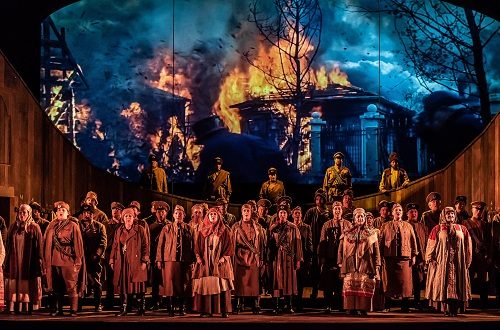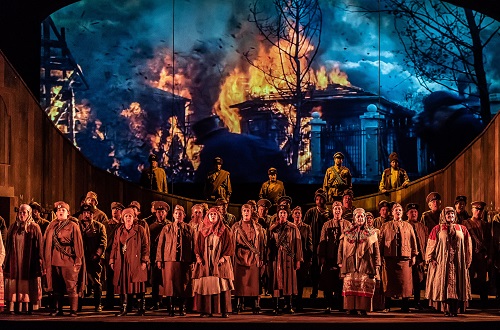 United Kingdom Prokofiev, War and Peace (ed. Ermolaeva/McAllister, sung in English): Soloists, Dancers, Chorus & Orchestra of Welsh National Opera / Tomáš Hanus (conductor), Royal Opera House, Covent Garden, London. 23.7.2019. (CC)
United Kingdom Prokofiev, War and Peace (ed. Ermolaeva/McAllister, sung in English): Soloists, Dancers, Chorus & Orchestra of Welsh National Opera / Tomáš Hanus (conductor), Royal Opera House, Covent Garden, London. 23.7.2019. (CC)

Production:
Director – Sir David Pountney
Designer – Robert Innes Hopkins
Costumes – Marie-Jeanne Lecca
Lighting designer – Michael Rippeth
Associate conductor – Harry Ogg
Video Projection designer – David Haneke
Assistant director/Choreographer – Denni Sayers
Tour Lighting – Ian Jones
Cast:
Jonathan McGovern – Prince Andrei Bolkonsky
Lauren Michelle – Natasha Rostova
Mark Le Brocq – Count Pierre Bezukhov
Leah-Marian Jones – Princess Marya Bolkonskaya
Jurgita Adamonytė – Hélène Bezukhova
Adrian Dwyer – Anatole Kuragin/First General/Ktutzov’s Aide de Camp, Adjutant, First Officer/Aide de Camp of General Compans/Bonnet/Barclay
Simon Bailey – Field-Marshal Mikhail Kutuzov/Balaga/Davoust/Old
Grenadier
James Platt – Count Ilya Rostov/Tichon/Berthier/Ramballe/Beningsen
Jonathan May – Prince Nikolai Bolkonsky
Donald Thomson – Jacquot/Yermolov/Secon Gendera/Second Staff Officer/General Belliard/Second Lunatic
David Stout – Dolokhov/Denisov/Napoleon/Raevsky
Samantha Price – Sonya/Peronskaya/Kondratyevna
Julian Boyce – Dr. Métivier/Servant
Carolyn Jackson – Vasilisa/Housemaid
Laurence Cole – Gavrila/Matveyev/Valet
Gareth Dafydd Morris – Platon Karataev/General Pyotr Konovnitsyn
Sarah Pope – Matriosha/Trishka
Joe Roche – M de Beausset/Abbé/First Lunatic
Rhodri Rhys-Jones – Fyodor/Ivanov
Owen Webb – Orderly/Gerard/French Officer
Paula Greenwood – Shopkeeper
No response to Tolstoy’s almighty novel War and Peace, surely one of the greatest pieces of writing ever, can afford to be a shrinking violet. Prokofiev knew this when he put himself to work on to the task of setting Tolstoy’s magnificent edifice to music. It was quite a journey, and there is a required essay by Katya Ermolaeva and Rita McAllister in the booklet. There are actually five different versions of War and Peace prepared by Prokofiev. The 13-scene version was premiered in 1959 at the Bolshoi under the great Alexander Melik-Peshayev, a production that ran for 23 seasons (so, the Bolshoi’s equivalent of the ENO/Miller Mikado, then). The new critical edition of War and Peace was prepared by McAllister for a 2010 production at the then-RSAMD, Scottish Opera and Rostov State Conservatoire. The critical edition is based on manuscripts in the Russian State Archive of Literature and Art and the Glinka National Museum Consortium of Musical Culture. The vocal score of the first edition is intact. Most of this was orchestrated, but those parts that were not required Rita McAllister’s informed intervention. The WNO production at its premiere was the first outing of their version of that edition – which includes a selection from later versions of the opera as ‘inserts’ to the original (the choral Epigraph from the second version, the New Year’s Ball Scene, a Choral Entr’acte, the Council of War scene – absolutely gripping on this occasion – and the choral finale). So far, so musicological, but it is a fascinating enterprise, underlining the fact that different versions of an opera, with differing scenes, and even in some cases differing languages and differing numbers of scenes and acts (Verdi’s Don Carlo/Don Carlos springs to mind) can result in equally satisfying – but musically and dramatically divergent – musical evenings.
Sung in English War and Peace might have been, but a nice touch was to have the work title in Cyrillic on the spine of the booklet. The surtitles did not always match exactly what was sung, which is slightly disconcerting if we are actually hearing the work in the vernacular. And that is basically getting the criticism out of the way: this was a spectacularly successful evening.
Sir David Pountney’s production is vast in the scope of its imagination; aptly, as the chorus (and list of participants) is huge. The ‘Epigraph’ is here the first scene – most usually heard as the introduction to the ‘War’ scenes. The Russian people prepare to defend themselves: fervently patriotically, as one might expect. The sheer fortissimo, dissonant force is overwhelming in this production. The WNO chorus is in fine fettle, repeatedly revealing heft and huge enthusiasm for the dramaturgical thrust, while unleashing its partying side in the Ball.
The stage is essentially static, with a semicircular wooden structure containing the on-stage action and projections towards the back. The projections include film excerpts from Sergei Bondarchuk’s 1966 film of the Tolstoy, but also, amongst many others, fabulous invocations of the atmosphere of a Russian Ball and a miraculous invocation of the fire of Moscow burning. One might accord green points for the recycling of the set for Iain Bell’s In Parenthesis, too. Robert Innes Hopkins’ design is striking, and effective. David Haneke is the imaginative video creator. Over that stage processes (literally, sometimes) a huge array of characters, including a view of Tolstoy himself, working at his desk, scribbling away. All of this seems to imply a work of Mussorgskian grandeur – and that is certainly there in spades – but, as in Tolstoy’s novel, there is a counterweight to the huge war scenes or the society ball scenes of the ‘Peace” section. Central to this supra-political aspect is the overarching power of Love, and at the centre of that exploration is Natasha Rostova, her emotions for the impulsive yet somewhat shallow Andrei, and those of her admirer, Pierre Bezhukov.
As Natasha, Lauren Michelle is supreme, living every inch of the pain of Russian life at this period and the emotional complications around her. The music gifted to her character by Prokofiev is gorgeous. The scene towards the end of the ‘War’ panel in which Andrei lies, dying and delirious, nursed by Natasha, is presented as a superb optical illusion in which a single window into their world is (pardon the pun) reframed so it appears like a look-down on them. This is a topsy-turvy world, Pountney seems to be saying; and simultaneously the ‘trick’ takes us into heartbreaking tenderness. Huge opposites exist, of decadence juxtaposed with the violence of war. The Andrei on this occasion, Jonathan McGovern, was in fine voice, but it was Mark Le Brocq’s bookish, bespectacled Bezhukov who stole the male part of the show, giving a finely nuanced reading that allowed us, the audience, to enter into his inner landscape as easily as Michelle did for Natasha Rostova.
It is clearly impossible to go into each and every soloist given the roster of singers. But it would be unfair not to admire David Stout’s fine, rich voice in the part of Dolukov (and Denisov, and Napoleon, and Raevsky). Whichever hat he was wearing, he excelled. He apparently has specialised in the role of Figaro, and also starred in WNO’s Figaro Gets a Divorce by the excellent composer Elena Langer. Simon Bailey’s Kutuzov, too, is astonishing, his soliloquy absolutely gripping vocally, musically and dramatically.
Brno-born conductor Tomáš Hanus (who has taken WNO to his hometown, in fact) conducts with drive, yet can give the music space when required. The orchestra is extraordinarily well-trained, and one has to acknowledge, too, the sheer stamina, not least from the brass, sounding as fresh at the close as in that shattering opening chorus. Hanus responds beautifully to Prokofiev’s weaving of the tale, moving easily between spectacle and whispered statement, marshalling the huge choral moments with ease.
It is really quite amazing that this was performed in Wales last year and had to be resurrected for this run given the prevailing performance excellence. The last time I encountered War and Peace live was just shy of 20 years ago, at the Kirov residency (where an unforgettable Semyon Kotko was also performed). The Ball Scenes are still there in my memory, transfixing and decadent. That, of course, was sung in Russian. I hope fervently it is not another 20 years before my next encounter; WNO’s evening was a salutary reminder of the sheer power of Prokofiev’s magnificent score. It has been a good week for opera, what with Opera Holland Park’s L’arlesiana and the Wolf-Ferrari/Tchaikovsky evening. And what a way to crown it.
Colin Clarke
